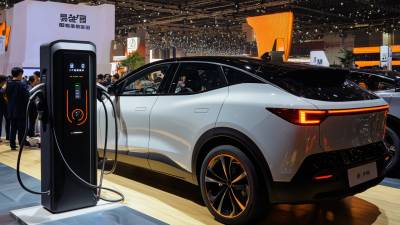Understanding the Importance of Car Charging Stations in Modern Transportation
In the era of rapid technological advancement and the global shift towards sustainable transportation, the significance of car charging stations cannot be overstated. Recent industry reports indicate that the global electric vehicle (EV) market is projected to reach an astonishing $800 billion by 2027, with a compound annual growth rate (CAGR) of 22.1% from 2020 to 2027. This surge in EV adoption necessitates a robust infrastructure of car charging stations to meet the demands of a growing fleet of electric vehicles. According to the International Energy Agency (IEA), the number of publicly available charging points must triple by 2030 to accommodate the anticipated rise in electric vehicles on our roads.

As urban planners and policymakers recognize the importance of this infrastructure, it is crucial for stakeholders to understand the role car charging stations play in promoting green mobility, enhancing accessibility, and shaping a sustainable future for urban transportation.
The Rise of Electric Vehicles: A New Era in Transportation
The rise of electric vehicles (EVs) marks a transformative shift in modern transportation. As more consumers embrace sustainability and seek alternatives to traditional gasoline-powered cars, the demand for reliable car charging stations has skyrocketed. This trend not only reduces greenhouse gas emissions but also fosters innovation in the automotive sector, where manufacturers are racing to produce more efficient and affordable electric models.
When considering the transition to an electric vehicle, it's essential to plan your charging strategies effectively. For instance, installing a home charging station can significantly boost your convenience, allowing you to charge overnight and start each day with a full battery. Additionally, familiarizing yourself with local charging networks and available apps can help you locate nearby stations, ensuring that you’re never caught with a depleted charge during your travels.
Moreover, understanding the different types of charging stations—such as Level 1, Level 2, and DC fast chargers—can aid in optimizing your charging habits. Level 1 chargers are typically suited for home use, while DC fast chargers can provide up to 80% charge in just 30 minutes, making them ideal for long road trips. As electric vehicle adoption continues to grow, adapting to this new era involves not just purchasing an EV but also embracing a new way of planning and executing travel.

5 Key Reasons Car Charging Stations Are Crucial for EV Adoption
The surge in electric vehicle (EV) adoption is intrinsically linked to the availability of charging stations. First and foremost, convenience plays a pivotal role in encouraging potential EV owners. By installing charging stations in easily accessible locations, drivers can seamlessly integrate EVs into their daily routines, alleviating range anxiety associated with long trips. This convenience eliminates one of the significant barriers to EV adoption, essentially making electric vehicles a more attractive option for a broader audience.
Furthermore, charging stations promote a sustainable future by facilitating the transition away from fossil fuels. As more charging infrastructure is developed, the shift towards renewable energy sources for electricity generation can accelerate. This not only helps in reducing greenhouse gas emissions but also encourages energy efficiency through innovative technologies. Lastly, establishing a robust network of charging stations enhances the electric vehicle ecosystem, fostering consumer trust and encouraging automakers to invest in EV technology. This results in a virtuous cycle where increased infrastructure leads to greater vehicle availability and, consequently, more widespread adoption of electric vehicles.
Understanding the Importance of Car Charging Stations in Modern Transportation - 5 Key Reasons Car Charging Stations Are Crucial for EV Adoption
| Reason | Description | Impact on EV Adoption |
|---|---|---|
| Convenience | Charging stations provide easy access for EV owners, allowing them to charge their vehicles as they go about their daily routines. | Increases the likelihood of EV usage due to reduced range anxiety. |
| Infrastructure Development | Growth of charging stations supports the broader development of EV infrastructure, including grid upgrades and renewable energy integration. | Promotes widespread adoption of electric vehicles. |
| Environmental Sustainability | Charge stations, especially those powered by renewable energy, contribute to a reduction in carbon emissions. | Encourages environmentally friendly practices among consumers. |
| Economic Benefits | Establishment of charging networks can create jobs and boost local economies by attracting EV owners to commercial areas. | Stimulates economic growth alongside EV adoption. |
| Government Initiatives | Many governments are incentivizing the installation of charging stations through subsidies and grants, leading to increased infrastructure. | Accelerates the transition to electric vehicles through supportive policies. |
How Charging Stations Enhance Urban Mobility and Infrastructure
The rapid transition towards electric vehicles (EVs) is reshaping urban mobility, with charging stations playing a pivotal role in this evolution. According to a report by the International Energy Agency (IEA), the number of public charging points worldwide exceeded 1.3 million in 2021, reflecting a 45% increase from the previous year. This growth is crucial for urban infrastructure, as cities expand EV adoption to meet sustainability goals and reduce greenhouse gas emissions. The availability of accessible charging stations not only meets the needs of current EV owners but also serves as a critical factor in encouraging potential buyers to switch from traditional gasoline vehicles.
Moreover, the integration of charging stations into urban landscapes enhances overall transportation efficiency. A report from McKinsey & Company indicates that urban areas with robust charging infrastructure see a 25% increase in EV usage compared to regions with limited access. This seamless incorporation facilitates longer journeys without range anxiety, thereby optimizing traffic flow and reducing congestion. As cities strive for smarter and greener mobility solutions, strategically placed charging stations become essential to meeting the demands of a growing electric vehicle market and reinforcing commitments to climate action.
The Role of Charging Stations in Reducing Carbon Footprint and Pollution
In recent years, the significance of electric vehicle (EV) charging stations has surged, particularly in the context of reducing carbon footprints and improving urban air quality. A study conducted in Wuhan highlights the crucial role that both EVs and electric vehicle charging stations (EVCS) play in enhancing air quality in urban settings. By integrating these technologies, cities can mitigate the harmful effects of traditional fossil fuel vehicles, leading to cleaner air and healthier communities.

Moreover, as the world transitions to low-carbon transportation solutions, the development of smart grid-enabled charging stations is becoming increasingly essential. These decentralized energy solutions facilitate the efficient use of renewable energy sources, which further diminishes reliance on fossil fuels. The ability to charge EVs using wind or solar power highlights a strategy for reducing greenhouse gas emissions while simultaneously addressing urban pollution. This combination of advanced charging infrastructure and electric mobility not only fosters a cleaner environment but also paves the way for sustainable urban living.
Innovative Technologies Shaping the Future of Car Charging Solutions
The landscape of electric vehicle (EV) charging is undergoing a revolution, heavily influenced by innovative technologies that are reshaping future charging solutions. Recent studies indicate that the electric vehicle AC charger market is projected to grow to USD 36.5 billion by 2032, with a compound annual growth rate (CAGR) of 22.9%. This rapid growth signifies the increasing demand for efficient and widely accessible charging infrastructures. The transition towards sustainable e-vehicle systems is also bolstered by trends in wireless charging technology, which is emerging as a game-changer in how we power electric vehicles.
Interestingly, advancements such as vehicle-to-grid integration are creating increased synergy between electric vehicles and the energy grid, further enhancing the efficiency and sustainability of charging solutions. For instance, the recent collaboration between hands-free charging technology providers and logistics companies marks a significant step in automating the charging process for large fleets, thereby promoting efficiency and reducing labor costs in transportation.
Tips:
- Consider investing in a home charging solution to take advantage of lower electricity rates during off-peak hours.
- Stay informed about local initiatives for EV chargers, as municipalities are increasingly partnering with companies to expand public charging networks.
Related Posts
-

Top 10 Car Charging Station Manufacturers in China at the 137th Canton Fair
-

Exploring the Global Surge in Ev Charging Stations Cost at the 137th Canton Fair 2025
-

Exploring Innovative Alternatives to Best Car Charging Stations for Global Purchasers
-

Unlocking the Potential of Best Electric Charging Stations Through 7 Real World Applications
-

Exploring Alternative Solutions to Best Home Charging Points for Electric Vehicle Owners
-

How to Successfully Install an Electric Car Charger at Home
